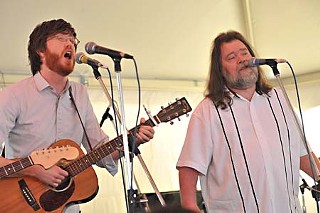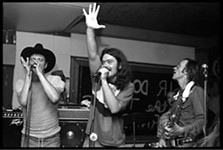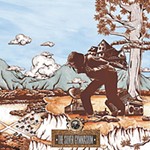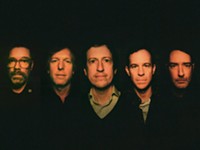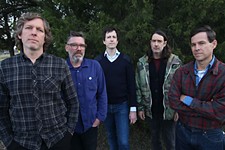Please, Judge
Roky Erickson and Okkervil River cast out all evil
By Austin Powell, Fri., April 16, 2010
After jumping the fence at Austin State Hospital, Roky Erickson was transferred to the maximum security Rusk State Hospital for the Criminally Insane. Incarcerated after a drug bust near Mount Bonnell in 1969 and subsequently diagnosed with "acute and undifferentiated" schizophrenia, the 13th Floor Elevators frontman wilted inside what he later called a "concentration camp," a personal hell of steel bars and white walls.
"It was pretty rough on him," affirms Rusk psychiatrist Bob Priest in the chilling 2005 documentary You're Gonna Miss Me. "Most of the time Roky would have a yellow legal pad, and he'd be sitting in the hallway somewhere writing music, real weak and slumped down ....
"At least it took his mind off where he was."
At Rusk, where he served until 1972 after pleading insanity at the behest of his state appointed legal counsel, Erickson wrote "Please Judge," an acoustic plea unlike anything else in his catalog. It's not a protest but a prayer, a desperate appeal of aching vulnerability, guarded by a bittersweet 1950s pop arrangement.
The song is now the centerpiece of True Love Cast Out All Evil, the 62-year-old native Austinite's eagerly anticipated collaboration with Okkervil River and first new studio recording in more than a decade. The LP, released next Tuesday on restorative L.A. imprint Anti- (Tom Waits, Bettye LaVette, Mose Allison), serves as a postscript to those trials and tribulations, with modern interpretations of the various demos he recorded primarily at or around the time of his incarceration.
"We kept struggling to find the right way to make 'Please Judge' work," recalls Okkervil River leader and True Love producer Will Sheff, who first attempted a full-band version of the original tune and later tried an Americana backdrop. "I had this breakdown where I didn't know what else to do.
"I kicked the rest of the band out of the studio and started playing the song on piano. ... I wanted something a bit rudimentary, so I made it only two chords and slowed it way down. That was when it really started to come together. Roky sat down next to me and just sort of adapted himself to it, three decades after the fact. There was this moment where all of us suddenly felt chills. He basically rewrote the song through performance. He made it real again."
Sheff didn't stop there. He scoured through hours of home videos, provided by You're Gonna Miss Me director Keven McAlester, to find the right aural snapshots to accentuate the song: the constant hum of an AC unit at the abandoned Austin State Hospital, the site of Erickson's chilling 1986 spoken-word piece "I Know the Hole in Baby's Head"; the feedback from a guitar solo during "The Beast" at Soap Creek Saloon in 1981; and most importantly, the sound of what Erickson once referred to as "his electronic friends," a suffocating barrage of TVs and radios that he surrounded himself with at the Del Valle public housing project in the early 1990s to drown out the voices in his head.
That madding collage of white noise emerges like night terrors midway through "Please Judge," only to drift back into the sonic subconscious and be swept away by Okkervil's closing, ornate chamber orchestration. Therein lies the symbolic brilliance of True Love Cast Out All Evil, a reconciliation of the past within the present, exorcizing Erickson's ghosts with expert precision and trust.
"Considering that years ago you didn't think he would be picking up a guitar or getting out of this house, this record is a hell of a thing, just fantastic," enthuses Henry Rollins, whose 2.13.61 imprint published 1995's Openers II: The Lyrics of Roky Erickson. "There's not one song of his that I don't like. That music is timeless."
The collaboration between Erickson and Okkervil was born out of their pairing at the Austin Music Awards in 2008, an event championed locally as Rokkervil. Erickson's manager Darren Hill later turned over to Sheff three discs' worth of archived material, roughly 60 field recordings dating back to the psychedelic glow of the Elevators. These largely forgotten artifacts of innocence and experience reveal the depth of Erickson's undiminished compassion.
"Note carefully how mercifully unpretentious they are," wrote the Mountain Goats' John Darnielle in the liner notes for Emperor Jones' revelatory 1998 demo collection Never Say Goodbye, which premiered several songs on True Love. "These depths aren't poses – they're heady, white-knuckled staring contests with the void. Their peaks are as exhilarating as their valleys are low."
Erickson's pyramid of song meets its perfect counterpart in Sheff's literary eye. Okkervil River's visceral folk narratives have long explored the dissonance between fact and fiction, a realm embodied by Erickson's near-mythic legacy and personal resurrection (see "Starry Eyes," Dec. 30, 2005). In his selections for True Love, Sheff gravitated toward the autobiographical material, drafting a vague chronological arc that allows Erickson's saga to be told in his own words, as if casting him as the lead character to Okkervil's own 2005 bloodletting, Black Sheep Boy.
"There's a danger with these comeback records in becoming this black-tie affair," relates Sheff, who also served as artistic director for the project. "The underlying method seems to be: 'He's all cleaned up now. We gave him a shave and a haircut and put him in a top hat and tails.' It's all very formal and professional, but that's not Roky. You can't approach him in a straightforward way because there's something mystical about what he does musically. He's a wild and woolly guy, and when you're around him, crazy things happen."
Instead, Okkervil treated each preproduction rehearsal and recording session as a live show for an invisible audience. The local sextet – rounded out by bassist Patrick Pestorius, drummer Travis Nelsen, trumpeter Scott Brackett, guitarist Lauren Gurgiolo, and keyboardist Justin Sherburn, with assists from Shearwater's Jonathan Meiburg and multi-instrumentalist Brian Cassidy – spent hours working on the songs, experimenting with tempos and arrangements, in anticipation of Erickson's arrival. Sheff even made a mixtape of Erickson's favorite artists – Little Richard, James Brown, the Rolling Stones, Sam Cooke, Bo Diddley, the Kinks, and Little Willie John, along with a personal footnote, Stax R&B artist Wendy Rene – to help the onetime Reverend of Karmic Youth relax in the studio.
Rokkervil's headlining showcase at La Zona Rosa during last month's South by Southwest gave some insight into what those practices must have been like. Sheff engaged the Elevators' visionary with the same sort of respectful encouragement and tireless enthusiasm as Erickson's youngest brother and former caretaker, Sumner, guiding the performance without pandering or pushing it. There were misfires, but Erickson's dramatic hand gestures and starry eyes demonstrated his engagement with the material.
The Rokkervil sessions proved a stark contrast to Erickson's last studio outing, 1995's All That May Do My Rhyme on iconic, defunct Austin indie Trance Syndicate, a roots-oriented retreading of greatest hits and rarities, including "Please Judge." The album was recorded with a disparate group of local benefactors, most notably Lou Ann Barton, Charlie Sexton, and the Butthole Surfers' Paul Leary, at a time when the focal point was trapped in a different kind of prison, the cacophonous and claustrophobic din of his Del Valle apartment.
"It was done conceptually on his behalf, to get him out and socializing again," assesses veteran producer Stuart Sullivan, who engineered the album as well as True Love and Okkervil's 2007 triumph, The Stage Names. "Roky was not nearly as engaged. It had the best intentions, but it felt like we were dragging him along a bit because he really wasn't ready for it.
"This time around it was a completely different environment. Will [Sheff] spent a lot of time with Roky and got to know him and interact with him on a very personal level. Not only that, but he had the vision and the craftsmanship to do it. His ability to connect with Roky really brought out something that I had never seen before."
True Love Cast Out All Evil has no easy comparison. Jimmie Dale Gilmore's 1994 haymaker with Mudhoney comes only as close in its crossover appeal as Johnny Cash's American series does in weathered introspection, but neither has the personal expanse nor the scarring intensity. The album is living tribute, the ultimate comeback album, touching on nearly every aspect of Erickson's legacy, as if looking unflinchingly into a broken mirror and finding peace with the shattered reflection. "Goodbye Sweet Dreams" chases the Elevators' high baptismal flow, "Bring Back the Past" excavates another power pop nugget, and "John Lawman," which is dubbed over an old radio session, returns to the scene of the psych survivor's 1980s horror-rock with bloody hammer still in hand.
More importantly, Okkervil River helps pen a new chapter to the saga, the band's intuitive and literary sophistication transforming the orchestral folk of "Be and Bring Me Home" and the triumphant grandeur of "Birds'd Crash" in a matter that's wholly different from their original incarnations. The field recordings that bookend the album, "Devotional Number One" and "God Is Everywhere," reiterate just how far Erickson's come, offering a final testimony to his resilience and spiritual awareness.
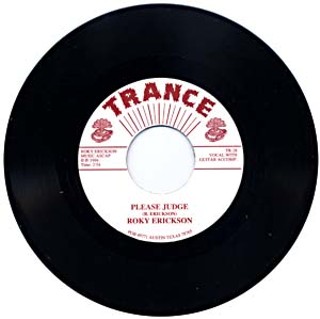
"The story, as awful and harrowing as it is, does not have a sad ending," Sheff concludes. "Roky's back with his first wife, Dana, and they have a wonderful relationship. He's reconnected with his son, Jegar, who he didn't know for decades. He's driving around in his first car and living in the first house he ever bought.
"That doesn't mean that the pain isn't real and that the scars weren't put there on him and in him, but he rose above it all."
Rokkervil plays the Paramount Theatre Saturday, April 24.






